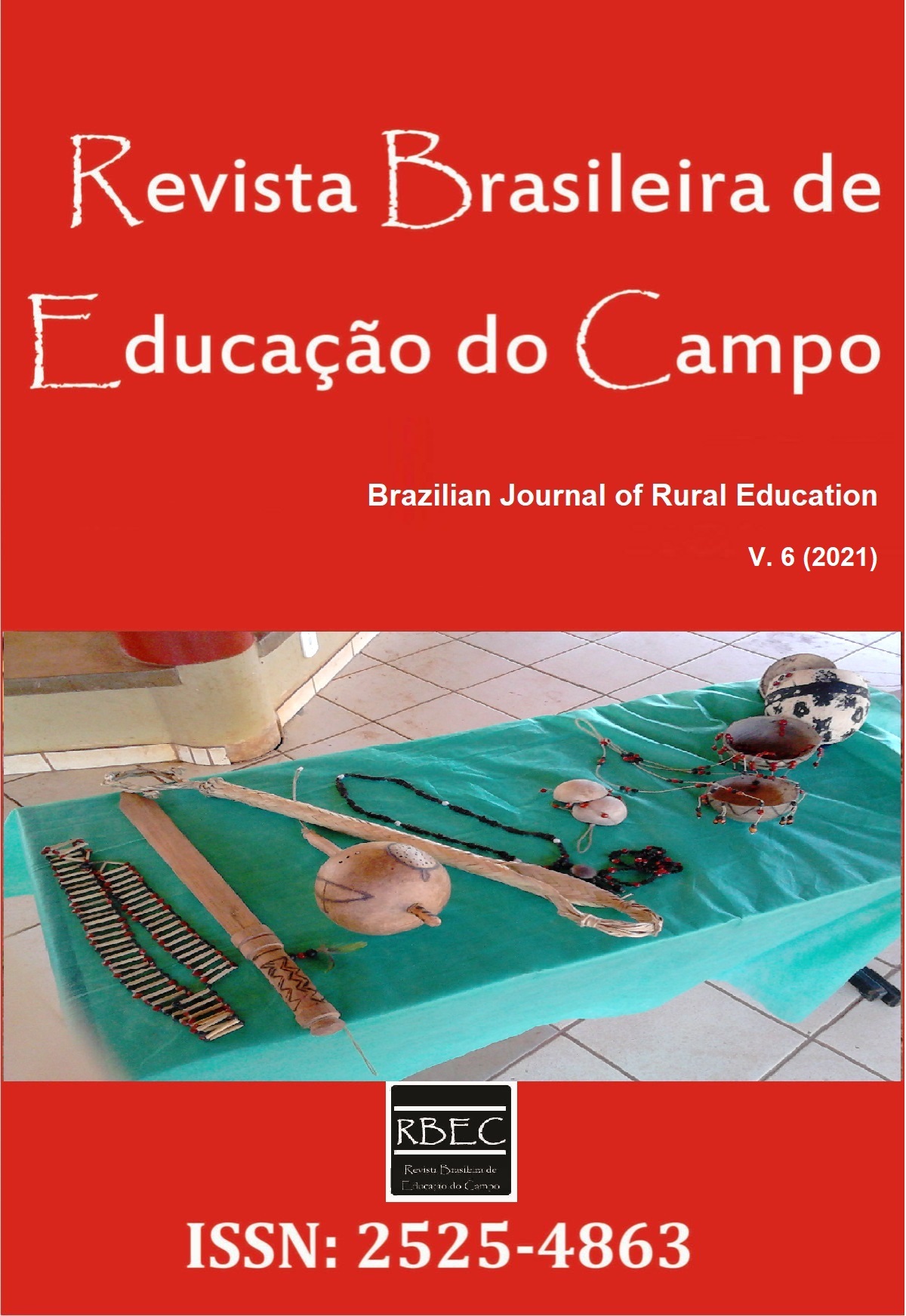Graduates’ perspectives of the Undergraduate program in Rural Education, Arraias Campus/Tocantins
DOI :
https://doi.org/10.20873/uft.rbec.e12819Résumé
ABSTRACT. This text is an excerpt of the Doctoral thesis in Education at the Federal University of São Carlos-UFSCAR, in which it presents a study on the Undergraduate program in Rural Education (LEdoC) at the Federal University of Tocantins, Arraias Campus, analyzing in to what extent the conditions of its materialization contribute to the formation of the working class. This paper aimed to analyze the materialization of the Undergraduate program in Rural Education from the perspective of its graduates. Therefore, we undertook an investigation that sought to answer the following question: What are the LEdoC graduates’ perspectives at UFT/Arraias campus, Tocantins? For this, we seek to unveil the object of study from the concrete reality, seeking to relate it to society in the search for understanding this movement of human formation in its entirety. Data collection took place through semi-structured interviews with 20 (twenty) LEdoC graduates in 2019. The results indicate that, in relation to the graduates, the number of students who completed it is still not expressive, given that only 37 (thirty-seven) of them completed the course. On the other hand, the graduates reveal that the course provided important contributions to their personal formation, since many now have another vision of “Rural Education”. In relation to insertion in the labor world, the course (and its specificities) is still not being contemplated in selection and competition edicts, both municipal and state, which demands attention to these issues, especially on the part of those interested. Given the data presented in this study, it is possible to see that LEdoC strives to make its proposal materialize in a satisfactory way; however, it has many challenges.
Téléchargements
Références
Aires, H. Q. P. (2020). Análise dos desafios e perspectivas do curso de Licenciatura em Educação do Campo, campus de Arraias, Estado do Tocantins (Tese de Doutorado). Universidade Federal de São Carlos, São Paulo.
Brasil (2002). Resolução CNE/CEB 1, de 3 de abril de 2002. Institui as Diretrizes Operacionais para a Educação Básica nas Escolas do Campo. Brasília. Recuperado de http://portal.mec.gov.br/index.php?option=com_docman&view=download&alias=13800-rceb001-02-pdf&category_slug=agosto-2013-pdf&Itemid=30192.
Brasil. Lei nº 11.769, de 18 de Agosto de 2008. Altera a Lei no 9.394, de 20 de dezembro de 1996, Lei de Diretrizes e Bases da Educação, para dispor sobre a obrigatoriedade do ensino da música na educação básica. http://www.planalto.gov.br/ccivil_03/_ato2007-2010/2008/lei/l11769.htm
Brito, M. M. B., & Molina, M. C. (2016). Estudo com egressos da Licenciatura em Educação do Campo da UNB no contexto da expansão da educação superior. In Anais do XXIV Seminário Nacional UNIVERSITAS. (pp. 1723-1746). Recuperado de http://www.ppe.uem.br/xxivuniversitas/anais/trabalhos/e_7/7-012.pdf
Fernandes, B. M. (2004). Diretrizes de uma caminhada. In Arroyo, M. G., Caldart, R. S., & Molina, M. C. (Orgs.). Por uma educação do campo (pp. 133-158). Petrópolis: Vozes.
Gadotti, M. (2001). A dialética: concepção e método. In Gadotti, M. Concepção dialética da educação (pp. 15-38). São Paulo: Cortez/Autores Associados.
Locatelli, A. S., Nunes, K. C. S., & Pereira, F. A. (2013). Educação do campo no estado do Tocantins: desafios pedagógicos e curriculares. Revista Espaço do Currículo, 6(3), 583-594.
Martins, L. M. (2006). As aparências enganam: divergências entre o materialismo histórico dialético e as abordagens qualitativas de pesquisa. GT: Filosofia da Educação/17. In Anais Reunião Anual da ANPED, 29, pp. 1-17. Recuperado de http://29reuniao.anped.org.br/trabalhos/trabalho/GT17-2042--Int.pdf
Marx, K. (1973). Contribuição para a crítica da economia política. Lisboa: Estampa.
Masson, G. (2012). As contribuições do método materialista histórico e dialético para a pesquisa sobre políticas educacionais. In IX ANPED SUL. Seminário de Pesquisas em Educação da Região Sul. Recuperado de http://www.ucs.br/etc/conferencias/index.php/anpedsul/%209anpedsul/paper/viewFile/966/126
Molina, M. C. (2017). Contribuições das Licenciaturas em Educação do Campo para as políticas de formação de educadores. Educação & Sociedade, 38(140), 587-609. https://doi.org/10.1590/ES0101-73302017181170
Oliveira, M. E. B. (2017). Educação do Campo, políticas públicas e movimentos sociais: o papel do Pronera na construção de autonomias relativas. In Foschiera, A. A., Cabral, J. P. C., & Cerqueira, O. N. (Orgs.). Educação do Campo e o campo de atuação da Escola Família Agrícola de Porto Nacional-TO: Pronera, Agroecologia e Camponeses (pp. 15-42). Palmas: Nagô.
Ribeiro, M. (2013). Política educacional para populações camponesas: da aparência à essência. Revista Brasileira de Educação, 18(54), 669-691. https://doi.org/10.1590/S1413-24782013000300009
Saviani, D. (2008). Escola e democracia. Campinas: Autores Associados.
Universidade Federal do Tocantins (2013). Projeto Político Pedagógico do Curso de Licenciatura em Educação do Campo: Códigos e Linguagens – Artes Visuais e Música. Arraias: UFT. Recuperado de http://download.uft.edu.br/?d=2b2b330c-2a4c-4065-93d3-dc1e7975728d:05-2014%20-
Téléchargements
Publié-e
Comment citer
Numéro
Rubrique
Licence
Proposal for Copyright Notice Creative Commons
1. Policy Proposal to Open Access Journals
Authors who publish with this journal agree to the following terms:
A. Authors retain copyright and grant the journal right of first publication with the work simultaneously licensed under the Creative Commons Attribution License that allows sharing the work with recognition of its initial publication in this journal.
B. Authors are able to take on additional contracts separately, non-exclusive distribution of the version of the paper published in this journal (ex .: publish in institutional repository or as a book), with an acknowledgment of its initial publication in this journal.
C. Authors are permitted and encouraged to post their work online (eg .: in institutional repositories or on their website) at any point before or during the editorial process, as it can lead to productive exchanges, as well as increase the impact and the citation of published work (See the Effect of Open Access).














